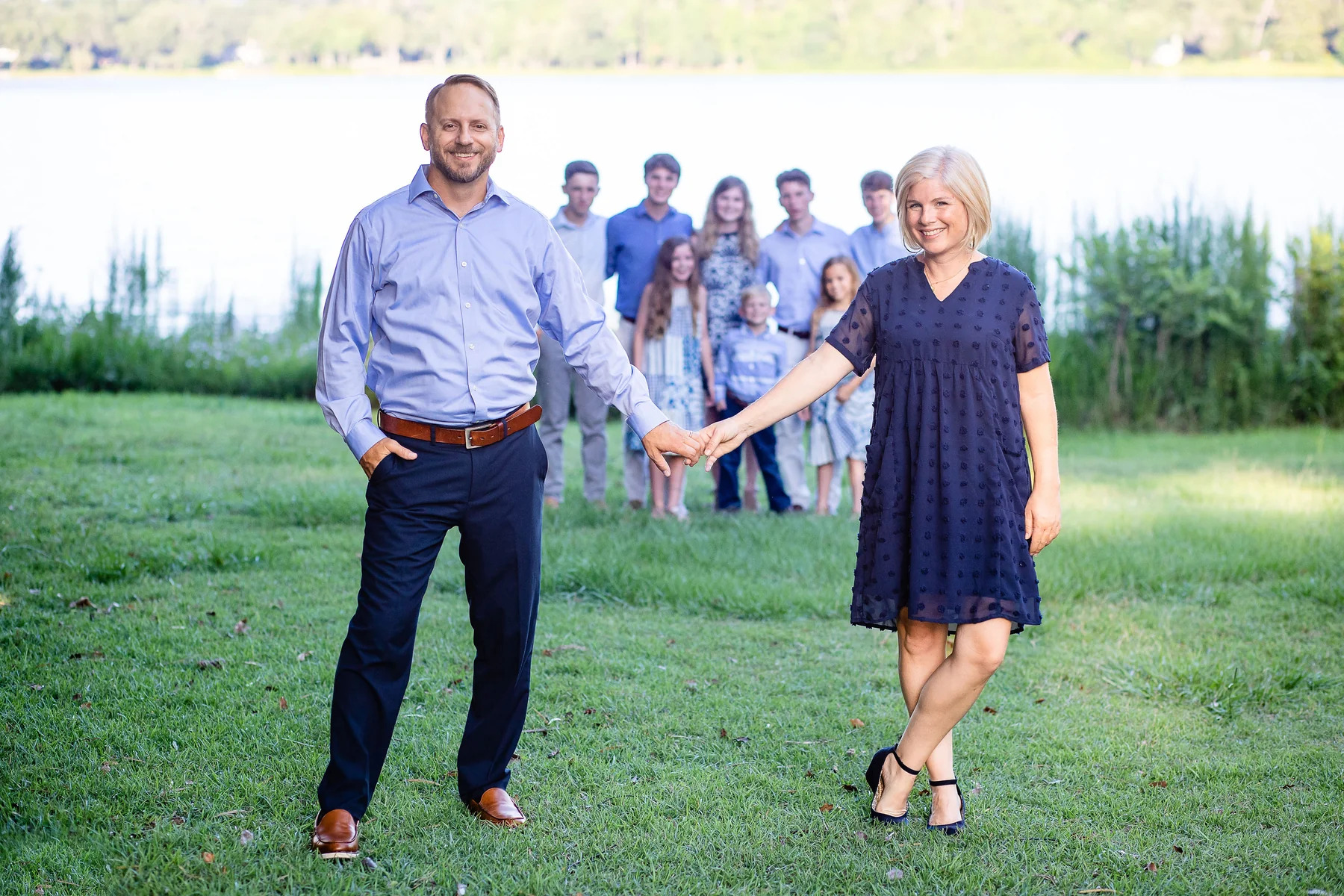When we accept contracepted sex as normal, we stop receiving children as a gift and we start to see them as a choice. This changes not only family dynamics, but the way we see ourselves, one another, and our sexuality, what we think will make us happy, and how we build cities and organize society and plan our lives.
This is the second part of a two-part series. The first part of this series was published under the title Stewards of Our Sexuality, or Finding Life After the F-Bomb.

I Am My Sister's Keeper
Several months ago, I was eating breakfast at a diner with a buddy and his adorable five-year-old daughter. After taking our order, the waitress turned to her and said, “Are you going to come waitress for me?” The daughter just smiled. The waitress continued, “Put you in a bikini and we’d make lots of money.” Politely but firmly, my buddy responded, “You are not exploiting my daughter.” The waitress walked off and the incident was soon forgotten.
I hope you find her comment revolting. But are we not, as a society, all guilty of this same idea? When she turns 13 and gets Instagram, she’ll get a bunch of direct messages from older men seeing what they can get from her. She’ll look around on Instagram and decide she needs to take pictures of herself in cute outfits in front of the mirror. And wear fake eyelashes. When she turns 16, we put her on the pill just to make sure that boys can use her for pleasure without causing “unwanted pregnancies.” When she turns 18, she can give consent to be exploited, and we can include her in the bikini-and-hot-rod calendars. Her boyfriend will expect her to put out after several dates, and he’ll be sure to wear a condom because that’s what he learned the responsible kids do. At least this girl has a dad who loves her enough to say, “You are not exploiting my daughter.”
Recently in the news:
“This week, several Australian Catholic schools cancelled talks by Jason Evert, an American speaker who specialises in presentations preparing young people for loving commitment in relationships and sexual responsibility. There were protests and a petition against his message. Outrage included this letter of complaint penned by girls from one of the schools.
‘We unquestionably do not need a middle-aged man who doesn’t believe in a woman’s right to contraception for her own safety and freedom speaking to an audience of young girls.’
Thousands of signatures were collected. And plenty of media coverage was enlisted to pressure the schools.... We are seeing the tragedy of parents who do not know what is good for their children. We all need to do our homework, and walk the walk, not just parrot slogans. This is not just in the realm of religious beliefs.
The very task of education is to form young people to think for themselves: a carefully curated process in which the young are protected from great dangers while they grow in autonomy. Even Aristotle wrote about the danger of slipping into habits before deep convictions and ideals take root. Effectively, we deny young people the capacity to run their own lives when we allow them to be sexualised. And this is happening before our eyes, perhaps in most families in the West. Not a happy thought.
Here is an excerpt from what an Anglican school principal in NSW wrote to parents last November:
'The sexualisation of our youth through mainstream and social media is a deeply disconcerting trend that we cannot ignore. Our young people find themselves bombarded with sexual imagery and ideals that foster unrealistic expectations, fuel insecurities, and drive them prematurely into the realm of adult themes for which they may not yet be emotionally prepared. As educators and parents, we must confront the undeniable challenges that arise from the sexualisation of our youth in the media. These challenges, though uncomfortable to address, are of paramount importance.'"
Why did these Catholic school parents stand against their school instead of standing up for the dignity of their own daughters? I recently saw a biker dude with this patch on his leather vest, “I AM MY SISTER’S KEEPER.” Parents might not stand up for their daughters, but I call on every man to stand up for your sisters.

Chastity and Marriage
What does the word “chastity” call to mind for you? Sixteen-year-old me thought of a stuffy old nun chasing the boys away from the girls, a “chastity speaker” telling you not to even think about having fun, or the mythical “chastity belt” to lock down your nether regions. Chastity sounded like a prison where you lock up your passions and keep them from breaking out. Once you get married and you can finally “do it” without going to hell, your pent-up desires rush out on a honeymoon that is about one thing and only one thing.
Sadly, it took me a long time to realize that a relationship based on steamy sex has all the warmth, intimacy, and permanence of a drug addiction. When you “fall in lust” with someone, the main thing you love about them is how they make you feel. Sexual intimacy is almost exactly like taking a “hit” from your favorite drug. Once this person no longer gives me the “high” that I used to get, I’ll need to either get them to spice it up for me or move on to a newer, stronger drug.
In his great work, Love and Responsibility, Pope St. John Paul II acknowledges that it is normal and healthy to find the opposite sex both physically and emotionally attractive. He refers to the physical attractiveness as “sensuality” and the emotional attractiveness as “sentimentality.” However, the person whom I find attractive is more than just a pair of big boobs and a booty, or surfer hair and a cute smile, more than just a good listener or a great night out together. As a person, he or she deserves to be loved in his entirety. That means I must learn to love the other for who she is, and not what she can do for me.
Chastity is a great start. It invites me to look deeper than mere sexuality. But there is more. One also needs, “emotional chastity,” that is, not putting 100% of your emotional needs on this one person. There needs to be restraint in holding hands, hugging, and kissing. These expressions of tenderness are good, but only after the couple has developed a true tenderness, that is, a sensitivity and understanding of the internal emotional depth of the other. Early expressions of tenderness can prevent the development of true tenderness and mask the fact that it hasn’t really developed yet. Sensuality and sentimentality are a good start but we don’t want the relationship to end there. Good boundaries help cultivate a deep personal relationship that is rooted in mutual respect and total self-giving love.
I now see that chastity is less about repressing and more about channeling your energy in a healthy direction. Think of a river that floods periodically. Some people build a dam to stop all that damn flooding. Now it floods less often but the floods are bigger and more destructive. Chastity is like building levees and banks. Rather than stopping the river, they gather it and point it in healthy directions so it can be life-giving and do useful work. In a similar way, the good boundaries of chastity create a healthy channeling of our sexual energy. The result is the power to truly love and be loved

The Call to Self-Giving Love
The Theology of the Body is the name given to a series of talks by Pope St. John Paul II. The core of his thought is that we are made in the image and likeness of God, and God is a giver. Each of us, therefore, is a gift, a unique and unrepeatable manifestation of the nature of God. He often quoted from Vatican II, “This likeness reveals that man, who is the only creature on earth which God willed for itself, cannot fully find himself except through a sincere gift of himself” (Gaudium et Spes, 25). Jesus lives a life of self-giving love and he calls us to do the same. Every vocation is a call to self-giving.
In Genesis 2, Adam sees his wife Eve as a gift from God. She is uniquely suited both spiritually and physically to receive his gift. He therefore makes a gift of himself to his wife and she receives his gift and, in doing so, makes of gift of herself in return. Unfortunately, most married couples see intimacy the other way around. They think of “sex” as something the husband gets from his wife, and she will often negotiate how much it will cost him to have it ("Okay, if you ___ and ___, then I won’t fake a headache this time."). No one enjoys being used. Sin has twisted the most amazing expression of self-giving into a form of using so degrading that we call it, “getting f*ck*d.”
God is the Creator, and his creation is “very good.” Evil does not create; evil can only twist and corrupt creation. It stands to reason that the most beautiful gifts that God creates, when twisted by sin, become the most ugly and disgusting things. So Lucifer was the Light Bearer, perhaps the most beautiful of God’s angels. But when he rejected God’s plan, he became the most evil of them all. Our human sexuality is the physical incarnation of the call to love and be loved. It was meant by God to be the most intense and enjoyable experience of self-giving love. This gift enables us to procreate, to help the Creator by bringing His sons and daughters into the world. We should not be surprised that the Enemy hates sex and wants to destroy it.
The problem is that quietly, and often without realizing it, we have bought the idea that sex is something I do for me. It’s about me getting my needs met. Instead of the law of the gift, we see it through the lens of using and being used. How many dates do you have to go on until the boyfriend has paid for enough dinners that you “owe him” sex? Safe sex is trying to get the pleasure without the baby because that would “ruin the fun.” We get mad at babies because they take so much, and we vow to only have a couple of them. Dating well should prepare us to give ourselves to the other in marriage. Marriage should prepare us for the total self-giving that is parenthood. God put self-giving love and life-giving together so he could call us out of selfishness and into self-giving love.

Harmony in Marriage
Recently I’ve started teasing married people, “I’m glad that God called me to a simple, easy vocation like priesthood, and not a difficult, complicated, and frustrating vocation like marriage.” Priesthood has the reputation for being a really hard vocation, and it is. But you can hide a lot of things in priesthood. In marriage, there’s no place to hide. Your weaknesses and insecurities are going to come out. The fact that you are trying to figure it out along with another flawed, wounded, imperfect human being makes things particularly complicated. "Am I struggling with something and you’re the normal one, or are you the weird one who is pretending your behavior is 'normal'?"
Like sounds bouncing back and forth, each spouse’s vibrations have a tendency to induce things in the other spouse. Couples with different strengths, weaknesses, struggles and flaws can be there for each other in amazingly beautiful ways. You don’t have to be perfect, or even close — you just need to be honest and loving, and committed to healing and reconciliation for yourself. The result can be a beautiful harmony of lives. The opposite is also true. The hurts, wounds, coping and pretending of one spouse can start to cause dis-harmonic resonances in the other spouse. The self-destructive harmonics can become really terrible, like the feedback from an out-of-tune sound system. These dis-harmonies can resonate for generations into our children’s future.
To get back on track, you need to listen to the “pitch pipe.” This is why Dr. Bob Schuchts places Spiritual Unity at the base or foundation of his five levels of intimacy. By “tuning in” together to God, the couple can begin to get back in harmony with each other. Dr. Bob sees sexual fulfillment not as the start of a happy marriage, but rather, a fruit of the work couples do to build intimacy at the other four levels. You can use these areas as a kind of examination of your relationship. Have an open conversation with your spouse about these areas of intimacy, with honesty but without accusation.
| AREAS OF COMMUNICATION | MEANS OF COMMUNICATING | OBSTACLES TO COMMUNICATION |
| SEXUAL FULFILLMENT | Expressing Affection and Lovemaking | Lust and Lack of Desire |
| COOPERATIVE TEAMWORK | Mutual Submitting and Agreeing | Control and Self-Reliance |
| DAILY COMPANIONSHIP | Working and Recreating | Isolation and Selfishness |
| EMOTIONAL INTIMACY | Listening and Expressing | Wounds and Unforgiveness |
| SPIRITUAL UNITY | Praying and Worshiping | Apathy and Opposition |
A glance at the “Obstacles to Communication” will show you basically all the modern attitudes that fill our culture. No wonder we have a difficult time engaging in meaningful intimacy!

You Can’t Give What You Don’t Have
Each of us is a gift, and God created us to give ourselves away. Pope St. John Paul II refers to this concept as, "the law of the gift." He was fond of quoting from the Second Vatican Council, “Mankind can only find himself through a sincere gift of self.” When we give ourselves away to someone or something worthy of our gift, we find that we actually posses more of ourselves than we started with. The concept of “vocation” is really the idea that God will call us to give of ourselves in the way that we were created to give. The previous article talked about the five levels of intimacy in marriage: Sexual Fulfillment, Cooperative Teamwork, Daily Companionship, Emotional Intimacy, and Spiritual Unity. These are the levels in which spouses give themselves and receive the gift of their spouse.
What a beautiful vision! Why is it, then, that so many couples experience Five Levels of Frustration: Sexual Frustration, Pulling-Against-One-Another, Daily Isolation, Emotional Disconnection, and Spiritual Disunity? I would suggest that the answer can be found in this phrase that is popular with philosophers: “You can’t give what you don’t have.” In order to make a gift of yourself to another, you must first be in possession of yourself.
Before offering you a mortgage on a piece of property, a bank will try to determine if the seller has a clear title. They look for liens placed by creditors, unpaid taxes, unsettled divorce proceedings, heirs that might have a claim on the property, etc. Whenever we make a free choice, we are in some way giving ourselves to the thing we are choosing. When we make good choices, we grow in self-control, and our freedom increases. When we choose evil, we become less than what we were meant to be. The evil has a way of trapping and ensnaring us. We become bent away from what is truly good and towards self-serving.
Bishop Barron is fond of the Latin phrase, “curvatus in se” which means, “curved in on itself.” Picture a heavy cell-phone user bent over, absorbed in his device, and oblivious to the beauty and goodness around him. Because fulfillment comes from giving, when I start to take, I feel less fulfilled. That emptiness often causes us to take more, and feel even more empty. I become less and less in possession of myself as I have given all these evils a claim over me.
In Luke 13:10-17, Jesus cures a woman who has been bent over for eighteen years. She straightens up and praises God. It happens to be the Sabbath day. Making time to praise God by keeping the Sabbath holy is a good way to prevent getting too curved in on ourselves. Jesus paid the price for each of us. He desires to set us free. Paradoxically, when I make a sincere gift of myself to Jesus and allow him to “own” all of me, it is then that I find I am truly in possession of myself!

Never Send a Boy to do a Man’s Job
Litany for Men in Christ, Men of the Church, Men for Others by Rev. Jon Vander Ploeg
- A boy wants to have fun. / A man wants to do his duty.
- A boy is concerned that he be liked. / A man is concerned that he be respected.
- A boy is infatuated with the immediate. / A man looks to ultimate consequences.
- A boy is often ill-mannered and ruled by his feelings. / A man keeps himself in hand.
- A boy is mainly self-focused. / A man looks out for others.
- A boy often shirks responsibility and is easily forgetful of it. / A man desires responsibility.
- A boy is impressed by show. / A man looks more deeply at character and principle.
- A boy needs external discipline to stay on the right path. / A man imposes his own inner discipline.
- A boy engenders chaos in ordered situations. / A man orders the chaos he encounters.
- A boy looks at rules as something to get around. / A man sees the purpose of rules and honors them.
- A boy is quickly distracted. / A man is focused and steady.
- A boy looks to be praised. / A man looks to express gratitude to others.
- A boy works in fits and starts and leaves jobs unfinished. / A man finishes his work.
- A boy tends to brag and strut. / A man does not exult himself, but lets his actions speak.
- A boy whines and complains at difficulty. / A man does not complain, but either acts or endures.
- A boy is distracted by things of little importance. / A man stays concerned with important matters.
- A boy avoids serious commitment. / A man looks for the right commitments and makes them.
- A boy waits passively for life to happen to him. / A man takes initiative according to his ideals.
- A boy dreams only of his own accomplishments. / A man helps others into their own full maturity.
Human society desperately needs its boys to grow into men, and its men to grow into fathers. Fatherhood is that combination of strength and gentleness, of unconditional love with constant challenging and encouragement. It happens when a man decides his life is not just about him and he’s willing to give and serve and sacrifice so that others can flourish. Fatherhood is the apex of masculinity. Unfortunately, a lot of “grown men” who still think and act like boys. Read the litany again as an examination of conscience of masculinity.
Just because someone is a mature adult, physically speaking, does not mean that he or she has grown up emotionally. You marry a fun-loving, carefree man… only to discover that deep down he’s a selfish, immature boy who won’t put his toys down and sacrifice for his wife and kids. You marry a sweet, sexy woman… only to realize that deep down she’s still an insecure, needy teenage girl. She’s willing to “mom” when she hast to but she wants to keep dressing like a teen and going out with her girlfriends most weekends. Marriage is challenging enough for two mature, grown-up adults. But it’s even more challenging when the couple are biologically in their 20’s or 30’s but still have a lot of growing up to do.
I was first introduced to this concept about 10 years ago. In 2014, one of my brothers took a “Life Skills Course” that tried to help you recognize the childlike, immature parts of you, and help them grow up. Once I digested this idea, I started to see it everywhere, including within myself. What stops people from maturing emotionally? I’m working to understand this question. Like with gardening, we often don’t know the soil or conditions are wrong until something fails to produce. A husband and wife who are healthy, mature, and virtuous, who live self-control in their own lives and know how to focus their energy and attention on the important things, will naturally create an environment that is secure and loving, comforting and encouraging, nourishing and challenging; in a word, the perfect environment for children to flourish and grow. Unfortunately, I suspect that most children right now are being raised by people who aren’t all that grown up themselves. I think we drastically underestimate the long-term effects of divorce on the survivors. Even intact family units that look healthy from the outside can introduce hidden struggles and stunted emotional growth for the children.
Your upbringing is not an excuse for bad behavior. Your parents got you this far; now you need to keep working on it. You are now “the parent” for the younger parts of you that haven’t yet fully matured. I don’t think any of us will ever be done growing until we die; I just can’t imagine myself getting to a point where I’ve run out of opportunities to learn and grow. Parenting isn’t just something we do for other people. Are you willing to work on yourself? When you try to hide your weaknesses, pretend you have it figured out, indulge in coping skills and avoid things that challenge or stretch you, the people around you will be stunted as well. Their attempts to be honest and vulnerable and their desire to grow will threaten the house of cards that you have built to protect your hurts and fears. When you do begin to grow, you also help the people around you feel secure and loved, comforted and encouraged, nourished and challenged. They start to flourish, too. Where there’s life, there’s hope! How will you learn and grow this week?

Happily Ever After, A Fairy Tale and a True Story
Dick and Jane grow up in modern American households. Whether they go to Catholic school or public school, they are very likely to be exposed to adult content online at a shockingly young age. After fooling around with themselves, Dick and Jane try stuff with other people (all consensual, of course). As long as they follow the steps from health class, it’s “safe” and nobody gets hurt. It also magically doesn’t hurt their chances of finding the right partner. When they do find each other, after a few dates they “make love”, go on vacations together, move in and “play house” for a while until they finally decide it’s time to tie the knot. They can buy Spot and Puff and/or a house together before or after marriage, whatever works for them. They have their preferred number of children (0 to 3), then one or both of them chooses to get sterilized (even Catholic hospitals offer sterilization every time you have a child). Dick and Jane both work so they have to find or pay someone to raise the kids for them. The kids enhance their Instagram-worthy vacations and don’t interfere with their ability to go huntin’ and fishin’ as often as they like. But they grow up so fast and now it’s time for them to move out and repeat the cycle.
Have you heard this fairy tale before? The vast majority of couples nowadays seem to think this is the road to happiness. The problem is, there are so many ways the story can go tragically wrong; it’s like playing a game of “Chutes and Ladders” but with far more chutes down than ladders up. Some of the unfortunate outcomes include isolation and stunting of emotional development (all addictions stunt your ability to mature emotionally), using sex as a substitute for conversation and meaningful intimacy with your loved one, unexpected pregnancy, sliding into marriage with the wrong person, waiting a really long time to get married to the right person, discovering that the pill or other methods made you sterile and you can’t have children when you want to, addiction ruining your marriage (56 percent of divorces involve one party having “an obsessive interest in pornographic websites”, Matrimonial Lawyers Association, 2003 Study). Many couples will later realize that a major motivation and consequence of limiting family size to an “ideal number of children” was that both parents and children could live more selfish lives. There isn’t much intimacy in a family where your spouse gets what’s left after work, kids, sports, and phone addictions have taken everything else. And kids don’t tend to turn out well when they are just a side project. Even when, improbably, everything has worked out just how Dick and Jane dreamed of it, the end result tends to be two people living together more as room-mates than as real romantic partners and team-mates. The modern American version of “Happily Ever After” is a game that nobody really wins. So where did things go wrong?
Here is another vision of what a happy marriage looks like. Joe and Maria are working hard to grow in every virtue, including chastity. This prepares them to make a total, faithful, fruitful and free gift to the right person. When they meet, they spend time getting to know each other and their families and working on the lower four levels of intimacy (Cooperative Teamwork, Daily Companionship, Emotional Intimacy, Spiritual Unity). Engagement is a chance for them to move some things in their lives to be in a place, physically and emotionally speaking, to welcome children. After a nice church wedding, Joe and Maria start to be sexually active on their wedding night and stay open to life throughout their marriage. They use Natural Family Planning to be good stewards of the power to create life, but they also trust in God to provide what they need. They work hard to keep growing in virtue themselves and to protect their children from harmful influences when they are little. The children learn that they are a gift and how to make a gift of themselves back to God and prepare for their vocations. Joe and Maria see themselves as being on a team together with God. The whole family is focused on a clear and beautiful mission to love God, love each other, share God’s love with the world, all become saints and live happily ever after in Heaven.
Let's compare these two concepts of "Happily Ever After." Did you notice how Dick and Jane’s lives tended towards self-indulgence? They see happiness as a fruit of having enough stuff or pleasurable experiences. Self-denial, willingly letting go of a pleasure, is inconceivable; life is obviously going to be less happy if they pass on any sort of pleasurable experience. On the other hand, Joe and Maria tend towards self-control. The couple decides what is truly good for them and their children, and they avoid whatever is less than truly good. Do you think that self-indulgence or self-control will lead to more happiness in the long run?
The second contrast we notice is that Dick and Jane are the ones in control of their own lives. They are trying to fill those lives with happy experiences, successful careers, the right number of children and plenty of pleasurable vacations. Without realizing it, they have built a relationship based on using and being used. “How much can I get from you, and what will it cost me?” The two cannot become one if they are both trying to be in control and are using the other to make themselves happy. Joe and Maria, on the other hand, see themselves as a gift. They have given their lives to God already. Marriage is about daily making a gift of themselves to the other. Does “mutual giving” or “mutual taking” more accurately describe the kind of romantic relationship(s) you engage in?
Many people like the idea of Joe and Maria’s relationship but think it can never really exist. It does exist! I invite you to listen to Episode 108 of the Restore the Glory podcast.
[image source: Walking With Purpose]

End With the Beginning in Mind
You’re not going to succeed at a project if you don’t really know what it is you are trying to accomplish. Neither will you succeed if you keep changing your mind about what your goals are. If we want stable family life, we need healthy marriages. If we want healthy marriages, we need healthy sexuality. Remember my two rules for healthy sexuality:
- If you are not married, you should not be sexually active, not with other people, and not by yourself.
- If you are married, you should be sexually active, but only in accord with the free, total, faithful and fruitful gift that is married love.
From my experience, the couples who are able to stay open to life during marriage are the ones who have taken two important steps. First, they have practiced chastity, so they are no strangers to the challenges, and rewards, of abstinence. Second, they have given their lives to God or are in the process of letting Jesus be the Lord of their life. When couples have these two conditions in place, they can experience a truly life-giving marriage.
Do we want our young people to be in a position to experience the happiness of a healthy Catholic marriage? Then we need to help them meet these two conditions. Older folks nowadays have no clue about the epidemic of pornography among young people. “Nine out of 10 children between eight and 16 have viewed pornography on the internet, and the average age a child first sees pornography online is 11.... Following first exposure, the largest consumer group of internet pornography is boys between the ages of 12-17…. Among men aged 18-24, 70% watch pornography.” (Chastity.com). The internet, and cellphones, mean that everyone has porn at their fingertips.
It’s more important than ever that every Christian model and encourage the virtue of temperance in every aspect of our lives. Sexual gratification is part of a large constellation of ways we try to meet our unmet emotional needs. The harder we try to meet our own needs in addictive ways, the farther we get from the intimacy, connection, and meaningful community that we crave. Each Christian needs to get emotionally and spiritually healthy himself so that he can offer those healthy connections to others. Secondly, we need to help our young people to know that Jesus is real and he wants to be their friend. As they walk in friendship with him, they will come to live in the ongoing encounter with God’s love and truth that brings them into healing and wholeness.
We cannot encourage anyone to live more virtue than we ourselves our willing to live. When our more experienced Catholics are living with people they are not married to or looking at things they shouldn't online, they are missing two opportunities: 1) to live a life of self-giving love, and 2) to show young people how the gift of their sexuality was meant to be used. We can’t show our children and grandchildren the way if we haven’t walked it ourselves. No matter where you’ve been, it’s never too late to give your life to Jesus and start down the road to chastity and true love.
[image source: NBC Nightly News]

Greater Love Has No One Than This
This is the last article of my series on sexuality. Back in January when I first started writing this series, I thought it would run 6 or 8 articles. I seriously underestimated the ways that the contraceptive mentality has altered our worldview. The longer I have wrestled with these issues, the more I have come to appreciate the clarity and wisdom with which Pope John Paul II unpacks the meaning and purpose of the gift of our sexuality. Accepting his teachings as true means also we also must reject the contraceptive mentality that underpins our modern concepts of dating, marriage, and intimacy. And that forces all of us to rethink our lifestyle choices to a greater or lesser extent.
Chastity is still a work in progress, both in my own life, in my thinking, and in my ministry. I know that my writings may have made some people feel guilty. It was never my intention to single anyone out. My hope, rather, was that in exposing places of shame and darkness, the light might also illuminate a path to healing. I have come to see struggles with chastity as signs that point us to the places where we we need to experience True Love. Rather than hide, deny, or excuse our bad behavior, we can come out into the light and let God’s truth and love heal us. I see chastity as an invitation to true love. I will probably spend the rest of my life learning what it means to truly love.
I am under no delusions that bulletin articles (even 19 of them!) are somehow going to change the culture that we are swimming in. Sadly, I know that many teens and adults will keep looking at porn on their phones and many couples will keep coming in for marriage prep having already decided to live together and contracept their way to the life of Dick and Jane. I am hoping, however, that a handful of single people will find the encouragement they need to pursue chaste relationships, and a handful of married couples will discover the blessing of natural family planning.
Reading my articles, you might have concluded that I want to wind the clock back to pre-1960. Not so! First of all, I do not believe that some point in history is more perfect, enlightened, or holy than this present moment, any more than I believe that our present culture is somehow the most enlightened in history. Second of all, it's easier than ever to evangelize. We don't have to go knocking on doors and trying to convert people. We can just wait for marriage, stay open to life, stay married, and and stay away from porn--and everyone will wonder what your secret is!
In the early centuries of the Church, Christians were noted for their sexual morality in the midst of a pagan culture saturated with sex. A Roman convert, Turtullian, explains to his fellow Romans that Christians share everything in common but not their wives. He also says that Christians don’t expose their infants, which was a form of legal abortion in the Roman world. We find ourselves living in a world that has made sex a god. We must not be afraid to proclaim that we were made by love and for love, and that True Love is Jesus who has sacrificed himself to make us whole again. The truth and love that comes from Jesus heals the lies and the wounds that come from being used and using others. His truth and love enables us to live True Love in our relationships with ourselves and others. If you remember nothing else from this series, I hope you remember that you are a gift, and your sexuality is a gift, and it is a gift that was meant to be given away.
Let me suggest some resources if you want to learn more:
- Men, Women, and the Mystery of Love: Practical Insights from John Paul II’s Love and Responsibility by Dr. Edward Sri
- Unwanted: How Sexual Brokenness Reveals Our Way to Healing by Jay Stringer
- Dopamine Nation: Finding Balance in the Age of Indulgence by Dr. Anna Lembke
- The Art of Living: The Cardinal Virtues and the Freedom to Love by Dr. Edward Sri
- Chastity.com by Jason Evert which is full of great articles and resources.
- Exodus90.com is a fantastic way to help men discover that self-control leads to better and more lasting happiness than self-indulgence. The next Exodus 90 starts January 20, 2025.